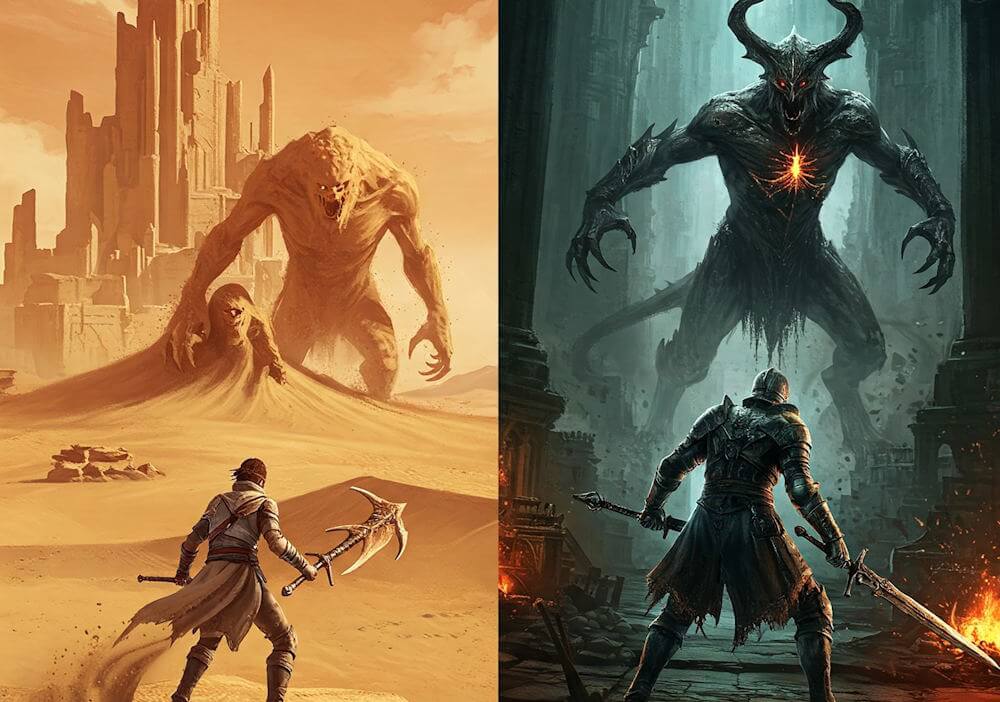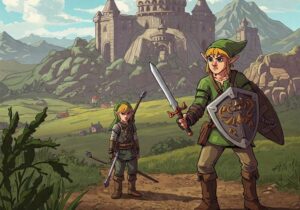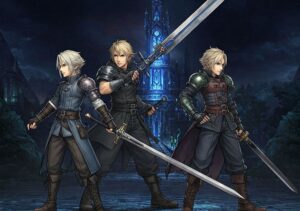The soulslike genre is a distinct category of action role-playing games known for their challenging gameplay, immersive environments, and intricate level designs. This genre originated with the acclaimed Dark Souls series, a franchise that has left a lasting impact on game development and design. Dark Souls is celebrated for its difficulty, demanding players to master combat mechanics, enemy patterns, and environmental navigation. The fusion of punishing challenges with rich narrative elements has redefined player expectations, setting a benchmark that many titles strive to achieve.
At the core of soulslike games is the concept of difficulty, often characterized by formidable foes and minimal hand-holding, which compels players to learn from their mistakes. This learning curve is integral, creating a rewarding sense of accomplishment upon overcoming obstacles. Players encounter intricate level designs that often feature interconnected worlds, where shortcuts and hidden passages reward exploration. These design choices not only enhance gameplay but also enrich the storytelling through environmental cues and subtle lore.
Lore is a significant aspect of the genre, often delivered through item descriptions, world-building, and character interactions rather than through traditional narrative structures. This approach fosters a deeper engagement with the story, inviting players to piece together the game’s mythology at their own pace. The fractured narrative style encourages exploration and interpretation, allowing players to forge their own connections with the in-game lore.
The influence of the Dark Souls series is evident in many contemporary games, including titles like Atlas Fallen and Lords of the Fallen. Both draw heavily from the foundational elements of the genre while adding their unique twists. As we delve into a comparative analysis of these two games, understanding their roots in the soulslike tradition will provide essential context for discerning their approaches to gameplay, design, and storytelling.
Overview of Atlas Fallen
Atlas Fallen is an action role-playing game that brings a fresh perspective to the soulslike genre. Set in a lush and diverse world, players embark on a journey through expansive biomes, ranging from verdant plains to treacherous deserts. The game is crafted with an emphasis on exploration, encouraging players to uncover the mysteries of a once-prosperous civilization now shrouded in darkness. The environment plays a crucial role, featuring dynamic weather conditions and a day-night cycle that enhances the immersive experience.
The core gameplay mechanics of Atlas Fallen distinguish it from typical soulslike titles. Combat is designed to be fluid and engaging, with a focus on enabling players to combine various abilities and weapon types seamlessly. The game introduces a unique aspect known as the “Sand” mechanic, allowing players to manipulate the environment and harness elemental powers during encounters. This innovation creates a strategic layer to combat, as players can tailor their attacks and defensive maneuvers based on the changing battlefield dynamics.
At the heart of Atlas Fallen lies an engaging narrative that unfolds as players progress through their adventures. The story examines themes of redemption and resilience, inviting players to confront the ancient entities that plague the land. Through quests and interactions with NPCs, the narrative deepens, revealing the rich lore that defines the world. The quest system is designed to be flexible, allowing players to explore various paths and make impactful decisions that resonate with the overarching storyline.
In summary, Atlas Fallen offers a compelling blend of exploration, combat innovations, and narrative depth, setting itself apart from other titles in the soulslike genre. By leveraging its unique features, it presents a notable contender for fans of action role-playing games, inviting newcomers and seasoned veterans alike to engage in its challenging yet rewarding experience.
Overview of Lords of the Fallen
Lords of the Fallen emerged as a notable title in the action RPG genre, striking a balance between challenging gameplay and engaging narratives while adhering to the soulslike tradition. The game’s narrative is centered around a dark fantasy realm where players assume the role of Harkyn, a fallen hero entangled in a struggle against a malevolent force known as the Rhogar. This overarching conflict resonates deeply with the genre’s typical storytelling approach, emphasizing themes of redemption and the perpetual fight against darkness.
One of the defining features of Lords of the Fallen is its innovative dual-realm system, which allows players to traverse between the world of the living and a twisted dimension inhabited by creatures from their nightmares. This mechanic not only enriches the storytelling experience but also introduces unique puzzle-solving elements and combat strategies, thereby allowing players to engage with the environment in novel ways. As players navigate these alternating realms, they encounter both familiar and unexpected threats, which enhances the overall atmospheric tension that soulslike fans have come to appreciate.
The game mechanics of Lords of the Fallen build upon established soulslike conventions while introducing its own progression system. Players can customize their character through various classes, abilities, and gear, which adds depth to the gameplay experience. The combat system emphasizes a mix of strategic planning and reflexive action, encouraging players to learn enemy patterns and adapt their approaches accordingly. Furthermore, the inclusion of a checkpoint system mitigates some frustrations commonly associated with the genre, enabling a more fluid gameplay experience. Lords of the Fallen successfully integrates these elements into a cohesive package that both honors the traditional soulslike style and offers fresh ideas to captivate newcomers and veterans alike.
Gameplay Mechanics Comparison
The gameplay mechanics of both Atlas Fallen and Lords of the Fallen offer distinct experiences while adhering to the challenging framework typical of soulslike games. In terms of combat styles, Atlas Fallen introduces a fluid action-oriented approach, encouraging players to engage in dynamic combos and utilize elemental abilities. The emphasis on speed and agility allows players to creatively experiment with various attacks, making each encounter feel varied and exhilarating.
Conversely, Lords of the Fallen incorporates a more methodical combat system that resonates well with traditional soulslike enthusiasts. This game requires players to master timing and precision, as enemies often deliver punishing blows. The combat mechanics focus on stamina management and defensive maneuvers, reinforcing the notion that patience is key to overcoming challenges. This dichotomy in combat styles exemplifies how both titles cater to different preferences within the soulslike fanbase.
Another crucial aspect of gameplay is difficulty levels. While both games maintain a commitment to challenging gameplay, Atlas Fallen provides a slightly more accessible entry point, allowing new players to adapt to the rigors of the genre. This is achieved through adjustable settings and a more forgiving response system, enabling players to enjoy the experience without feeling overwhelmed. On the other hand, Lords of the Fallen intensifies the difficulty by establishing high stakes in encounters, which demands both skill and strategic planning from players.
Exploration mechanics further distinguish how each title engages players. Atlas Fallen encourages exploration through vibrant world design, rewarding players with secrets and lore that enrich the overall narrative. In contrast, Lords of the Fallen combines linear pathways with intricate level designs that promote backtracking, a staple in soulslike titles, to uncover hidden areas and enhance character progression.
Overall, the gameplay mechanics of both Atlas Fallen and Lords of the Fallen provide distinct experiences that appeal to different subsets of soulslike fans, showcasing the diversity within this growing genre.
Visual and Artistic Design
The visual aesthetics and artistic design play a fundamental role in shaping the identity of both Atlas Fallen and Lords of the Fallen, especially for soulslike fans who deeply appreciate the immersion that these elements provide. Atlas Fallen features a visually striking world characterized by expansive deserts and unique landscapes. The environmental art captures the essence of a sun-soaked landscape, blending a vibrant palette with dynamic lighting that reinforces the game’s atmosphere. Each location is meticulously crafted, offering diverse terrains that encourage exploration and enhance the overall gaming experience.
In contrast, Lords of the Fallen employs a darker, more gothic aesthetic reflective of its narrative themes. The character models and enemy designs exude an intricate level of detail, showcasing a variety of weapon types, armor sets, and malevolent creatures. The game’s art direction evokes a sense of dread, complemented by a somber color scheme that effectively communicates the grim battles and challenges players face. Such artistic choices create an environment that feels alive and immersive, further engaging players in its lore-rich universe.
Both games also exhibit impressive graphical fidelity, showcasing the advancements in technology that allow for more lifelike animations and detailed textures. This level of detail is crucial, as it not only enhances the visual storytelling but also helps in establishing an emotional connection between players and the game world. The environmental storytelling in both titles serves to further immerse players, whether through the ancient ruins in Atlas Fallen or the decaying architecture in Lords of the Fallen. Each game’s unique visual identity, therefore, contributes significantly to the overall experience, making it essential for soulslike enthusiasts to appreciate these artistic choices.
Story and Lore Exploration
The narratives of Atlas Fallen and Lords of the Fallen are vital aspects that significantly contribute to the players’ immersion in their respective worlds. Soulslike fans appreciate intricate lore, multilayered storytelling, and deep character arcs, which both titles attempt to deliver, albeit in distinct ways.
Atlas Fallen offers a narrative steeped in mythological elements, where players navigate through a beautifully rendered world filled with ancient ruins and a dark past. Players take on the role of a hero who must rise against an oppressive force, and the storyline unfolds gradually through environmental storytelling, item descriptions, and character interactions. This method of world-building encourages exploration and genuine investment in the story, pulling players into its lore-driven universe. The connections between characters and the evolving plotlines provide a sense of personal stakes, elevating the overall narrative experience.
In contrast, Lords of the Fallen provides a more traditional narrative structure combined with deep lore intricately woven into the game. Set in a dark fantasy realm, players engage with a rich backstory that emphasizes the struggle between light and darkness. The protagonist’s journey is marked by an emphasis on character development, as decisions made throughout the game shape the narrative’s path. This approach invites players to dive into the intricacies of the characters’ relationships and the world’s multifaceted history. The game employs a variety of lore-based elements, such as tomes and dialogues, to deepen the player’s understanding of its universe.
Both Atlas Fallen and Lords of the Fallen strive to create engaging narratives that resonate with soulslike enthusiasts. While Atlas Fallen leans toward an exploratory lore experience, Lords of the Fallen prioritizes a structured narrative filled with substantial character growth and rich background. Each title offers unique elements for players to uncover, enriching their journey through these captivating worlds.
Community and Reception
The reception of both Atlas Fallen and Lords of the Fallen among the gaming community has been a topic of considerable discussion. Players and critics alike have offered varied reviews, emphasizing different aspects that resonate with their expectations of the soulslike genre. User reviews, ratings, and community discussions on platforms such as Reddit, Steam, and Twitter reveal the sentiments surrounding each title, showcasing both enthusiasm and critiques.
Lords of the Fallen, as a sequel and spiritual successor to its predecessor, has garnered a solid fanbase since its release. Players often highlight its intricate world design and challenging gameplay as key factors in their enjoyment. The game has been praised for its innovative mechanics and how it builds on the foundations laid by the original title. Critiques, however, mostly focus on the pacing issues and narrative depth, which some feel don’t fully meet the high standards established by other acclaimed soulslike games.
In contrast, Atlas Fallen has created a unique niche for itself, appealing to players who are looking for a fresh take within the genre. Community feedback has centered around its combat mechanics and creative approach to gameplay, with many players appreciating the enhanced freedom of exploration. Some criticisms arise regarding enemy diversity and the overall challenge posed by the game, which some fans of the genre found lacking in depth.
Discussions surrounding both games continue to flourish on various forums, with communities debating the strengths and weaknesses of each title. Social media platforms see an ongoing exchange of opinions where ardent fans express their preferences, unfurling diverse perspectives about what each game brings to the table. This communal dialogue not only enhances the understanding of both games but also highlights how they resonate with soulslike enthusiasts, ultimately shaping their legacies in the gaming landscape.
Marketing and Hype: Impact on Expectations
The marketing strategies employed for both Atlas Fallen and Lords of the Fallen played a significant role in shaping fan expectations and building anticipation before their respective launches. Both titles approached marketing with varying tactics, impacting how each game was perceived by the community. A trend in contemporary video game marketing is the use of promotional trailers and high-quality gameplay reveals, and both games utilized these effectively to capture audience interest.
For Atlas Fallen, the marketing campaign emphasized its unique setting and innovative combat mechanics through visually stunning trailers. These promotional materials highlighted the aspects of exploration and player choice, resonating with the desires of action RPG enthusiasts. Additionally, pre-release community engagement, such as developer Q&A sessions and content creator partnerships, further fueled excitement. Fans responded positively to insights about gameplay mechanics and the immersive world, increasing anticipation for the title’s release.
On the other hand, Lords of the Fallen‘s marketing adopted a somewhat different approach. It built on the legacy of its predecessor, appealing to Soulslike fans with a comprehensive showcase of its challenging gameplay and dark atmosphere. The trailers effectively conveyed the game’s grim aesthetic and the punishing nature of its encounters, aligning with the expectations of dedicated players who enjoy a high level of difficulty. Furthermore, the inclusion of behind-the-scenes content provided insight into the development process, fostering a sense of connection between the community and the developers.
Ultimately, the anticipation around each title was skillfully crafted through strategic marketing efforts. While Atlas Fallen sought to attract a broader audience by focusing on innovation, Lords of the Fallen reinforced its identity within the Soulslike genre, ensuring that fans’ expectations were met in alignment with their gaming preferences. These differences in marketing may have influenced overall reception, making it a crucial aspect in the debate of which title resonates more deeply with players.
Final Verdict: Which One Wins?
After a comprehensive analysis of both Atlas Fallen and Lords of the Fallen, several key factors emerge that may influence soulslike fans’ preferences. Both titles present unique gameplay mechanics that cater to enthusiasts of the genre, yet they differ significantly in execution and overall appeal.
In terms of gameplay mechanics, Atlas Fallen offers a dynamic combat system that emphasizes fluid movement and strategic agility. This allows players to engage in battles that feel more action-oriented compared to the more methodical approach found in Lords of the Fallen. The latter leans into the familiar soulslike formula, promoting a style that rewards patience and tactical thinking. Fans who appreciate the intense exhilaration and freedom of movement may gravitate toward Atlas Fallen, while those who prefer the traditional soulslike challenge may find a deeper connection with Lords of the Fallen.
Moreover, the story depth plays a pivotal role in the overall gaming experience. Lords of the Fallen has been noted for its intricate world-building and rich narrative, which enhances immersion and engagement. In contrast, Atlas Fallen provides a more streamlined storyline that may appeal to players who prioritize gameplay over lore. The community responses to both titles have been enthusiastic, with fans praising the strengths of each game while also critiquing their shortcomings, thereby creating a lively discourse around their merits.
Ultimately, the verdict may hinge on what specific elements resonate most with soulslike fans. For those seeking a fast-paced, action-driven experience with an emphasis on agility, Atlas Fallen may win out. However, for players who appreciate a well-crafted story and the traditional soulslike challenge, Lords of the Fallen stands as a robust contender. Each game contributes to the genre in profound ways, and choosing a favorite is largely subjective, influenced by individual preferences and gaming experiences.




